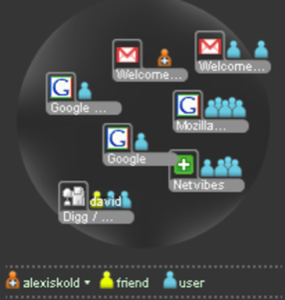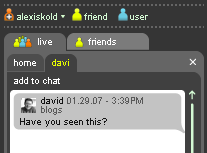Written by Alex Iskold and edited by Richard MacManus
Last year at DEMOfall a
company called Vapor Stream generated a lot of
controversial press because it introduced an email system capable of completely erasing
any trace of your communication. This year, one of the contenders that may generate a lot
of controversy is Me.dium – a Colorado based startup
that meshes up attention, web surfing and chatting to deliver extreme, real-time social
networking, right in the browser.

The idea behind me.dium is to let you see and communicate in real-time with your
friends and other people online who are “close” to you, based on what sites you are
visiting on the Internet. Implemented as a browser add-on, me.dium continuously captures
your locations on the Web (i.e. which sites or services you are using), sends this data
to the centralized server and computes a map of other sites and users that it determines
is relevant, based on your context. Here is a screenshot of it in action:

The map above is displayed using a network-like visualization, where distance between
your site and other sites represents the inferred level of relevance.
The users are displayed at the sites – and the
more popular the site, the more users you will see. Your friends are color coded
differently from other people. Since these displayed users are actual people, me.dium
takes the next logical step and embeds a chat window which allows you to chat with these
users in real time.

The thinking behind me.dium
This product was inspired by real-life examples. According to the company web site,
often our decisions are influenced by the decisions of others. Whether shopping for a car
or choosing a movie or a restaurant, we often rely on the judgement and recommendations
of others. Geographical proximity plays an important role, as we often strike
conversations with complete strangers in order to find the “best deal”. So the founders
of me.dium asked the natural question: Why not do the same online?
Can this really work?
The idea is intruiging and so is the product, but can it really work? The key question
is: Is it useful to be able to interact with other people who doing/looking at similar
things? We think that yes, it is useful – but not all the time and not intensely. It is
important to remember the lessons of the Uncertainty Principle in Quantum Mechanics – if
you interact with the system, you change it. While sometimes it is interesting to ask
people around you what they are thinking, you can’t do that all the time; otherwise,
instead of doing what you are doing, you are just talking to other people about it.
Also the current implementation, particularly UI and user experience, need to be
improved when letting the user request to see the sites and people nearby. Particularly,
a control that would say: just show me my friends (vs. everyone else) would be really
useful. Also, to facilitate the right interactions, it is important to reveal more
details about the other sites without much drilling. Perhaps a list of sites with
descriptions would be a good alternative user interface, as the moving network of nodes
is just too distracting.
Privacy concerns
The success of me.dium does not just hedge on the level of the user interest and the
interface. Handling of privacy is a big part of the acceptance equation too. Right now,
the tool immediately starts collecting all the private browsing/attention data and
storing it on a centralized server. The company claims it is safe, because they spent a
lot of time thinking about security. But a lot of privacy advocates will be upset when
they hear about their browsing data being collected and stored somewhere. Overall, it
seems to me that the tool takes a fairly aggressive approach to data collection. The key
counter point from the company is that they need all this data in order to deliver the
service and utility.
Conclusion
In its current re-incaranation, me.dium appears quite intrusive – both from privacy
and activity point of view. It does not mean, however, that this idea is bad or that it
cannot succeed. On the contrary, I believe that it has a lot of potential and with a bit
of tweaking can take on and spread virally. The key things that need to fall into place
are: user experience and (perhaps more importantly) full, fine-grained control of the
user information by the actual user. As it stands, me.dium is bound to generate a lot of
controversy and discussion. So please jump right in and tell us what you think.

















